
Even while our vision gets worse gradually as we age, there are a variety of lifestyle choices that can also have an impact. There are many things we can all do to improve our vision, from eating the correct foods to spending less time on devices.
Here are the top 10 foods for eye health that you may easily regularly include in your diets:
Fish
Omega-3 fatty acids, which your body can benefit from in a number of ways, are rich in fish. For us, the advantages it may have on our eye health are most significant.
Because oily fish have oil in their intestines and body tissue, eating them results in higher quantities of omega-3-rich fish oil. The fish with the highest amounts of omega-3 fatty acids are:
According to several studies, fish oil may cure dry eyes, including those brought on by excessive computer use.
Nuts and legumes
Omega-3 fatty acids are also plentiful in nuts. The large amount of vitamin E found in nuts can shield the eyes against deterioration brought on by aging. In most grocery stores and online, nuts are available for purchase. Healthy nuts and legumes for the eyes include:
Seeds
Seeds contain a lot of omega-3 fatty acids and are a strong source of vitamin E, just like nuts and legumes.
You may purchase seeds online and at the majority of supermarket stores. Some seeds high in omega-3 fatty acids are:
Citrus fruits
Vitamin C content is high in citrus fruits. Vitamin C is an antioxidant that has been recommended to prevent age-related eye damage, just like vitamin E.
Citrus fruits high in vitamin C include:
Dark, leafy green vegetables
Dark, leafy green vegetables like spinach and kale are excellent sources of energy and can help you live a healthier life. The antioxidants known as carotenoids, which are particularly abundant in these foods, are thought to lower or delay the onset of AMD (age-related macular degeneration), the most common cause of severe sight loss in those over the age of 55.
Additionally, they have lutein and zeaxanthin, two excellent sources of vitamin C.
Leafy greens that are well-known include:
Carrots
Both beta-carotene and vitamin A are rich in carrots. Carrots have an orange color because of beta-carotene. Vitamin A is crucial for vision. It is a component of the protein rhodopsin, which helps the retina absorb light. Although there is conflicting evidence on beta carotene's contribution to vision, the body needs it to produce vitamin A.
Sweet potato
Like carrots, sweet potatoes are rich in beta-carotene. Additionally, they are a significant source of the antioxidant vitamin E.
Lean poultry and meat
Anything with a high zinc content is beneficial for our diet because it helps transport vitamin A from the liver to the retina. Once there, it's used to produce melanin, which can aid in protecting both your skin and your eyes.
You can improve your intake of eye-friendly minerals by eating beef, pork, and chicken in addition to oysters, which have the highest zinc content of any food.
Eggs
Like lean meats, eggs are high in zinc, which your body uses to absorb the lutein and zeaxanthin in egg yolk.
These natural compounds help your eyes in preventing the dangerous blue light that can hurt your retina.
Brussels sprouts and broccoli
These closely related vegetables contain vitamin A (as lutein, zeaxanthin, and beta-carotene), vitamin C, and vitamin E, which is another potent combination of minerals. All of them act as antioxidants to shield the cells in your eyes from free radicals, an unstable molecular type that damages sound tissue. Your retinas are particularly weak.
Water
It may not come as a surprise that a substance required for survival is also crucial for eye health. Preventing dehydration can help with dry eye symptoms by increasing water intake.
Your suggested daily intake should be the following if you want to keep your eyes healthy:
Final Word
Eat more of these above foods for eye health. For the majority of people, eating a varied diet that is rich in fruits, vegetables, and lean meats is sufficient to guarantee they obtain the nutrients they need for good eye health.
If a person cannot get enough of these nutrients through their diet, they should speak to an eye doctor about taking eye health supplements. If you have vision problems or follow a very strict diet, speak with an eye care specialist about the best foods to eat.